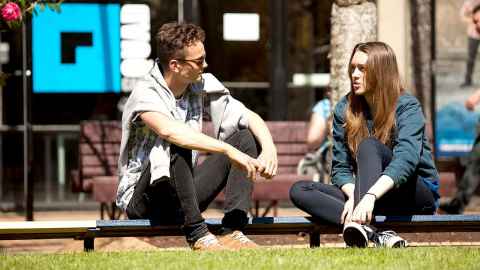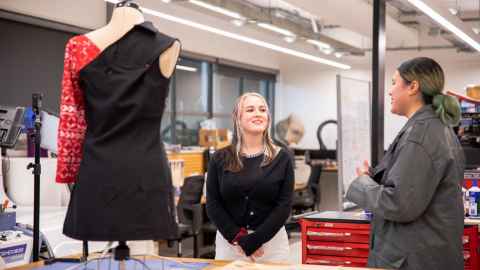Programme overview
The world is changing, almost faster than we can keep up with. While we can’t accurately imagine future realities, we can develop skills that will help us adapt to them.
The Bachelor of Design uses a combination of case studies and real-world project briefs to enable your experimentation in making and prototyping. You will investigate the potential practical, social, political and environmental impacts of different design outcomes, using both digital and material technologies. Your learning will be supported by research academics and specialists drawn from industries relevant to contemporary design.
You can also study the BDes alongside another discipline as part of a conjoint degree, which means you can take two undergraduate programmes at the same time. You can do a conjoint with Arts, Commerce, Engineering (Honours), or Science.

Conjoint programmes let you pursue two undergraduate bachelors degrees at the same time.
Learn more about conjointsProgramme structure
In your first year of study, you’ll be introduced to design methods, processes and rationale. You will also investigate design as a driver and responder to social needs in both contemporary and historic contexts.
Throughout your degree, you will build a personalised study plan around your Stage II compulsory courses, selecting your electives from four design themes:
- Design and Local Community Practices
- Design and Global Challenges
- Design and Business
- Design and Emerging Technologies
You can choose to focus on one or two design themes, or you can mix and match courses to suit your experience and developing interests.
In your final year, you will undertake a capstone design research project, working from the initial discovery phase right through to testing and implementation. This will be supported by a course aimed at advancing your understanding of design research methodologies. You will document your creative process in your project report.
The broad structure of the programme is:
- Seven core courses: DESIGN 100, 101, 200, 201, 300, 303, 304 (165 points)
- Nine elective courses from your chosen design themes: DESIGN 210-243 (135 points)
- One Waipapa Taumata Rau course (15 points)
- One General Education course (15 points)
- Two additional elective courses from this degree or other bachelors degrees (30 points)
Most students need to take one General Education course.
Students should also be aware of the University’s Academic English Language Requirement.
Sample programme structure
Year 1 120 points
-
- Code:
- DESIGN 100
- Name:
- Design Methods and Processes 1
- Type:
- Compulsory core course
- Points:
- 30 pts
-
- Code:
- DESIGN 101
- Name:
- Design Theory and Fundamentals
- Type:
- Compulsory core course
- Points:
- 15 pts
-
- Name:
- Elective taught course
- Type:
- Elective taught courses
- Points:
- 15 pts
-
- Name:
- Elective taught course
- Type:
- Elective taught courses
- Points:
- 15 pts
-
- Name:
- Elective taught course
- Type:
- Elective taught courses
- Points:
- 15 pts
-
- Code:
- WTRENG 100
- Name:
- Waipapa Taumata Rau
- Type:
- Core course
- Points:
- 15 pts
-
- Name:
- General Education course
- Type:
- General Education course
- Points:
- 15 pts
Year 2 120 points
-
- Code:
- Design 200
- Name:
- Design Methods and Processes 2
- Type:
- Compulsory core course
- Points:
- 30 pts
-
- Code:
- Design 201
- Name:
- Creative Communities
- Type:
- Compulsory core course
- Points:
- 15 pts
-
- Name:
- Elective taught course
- Type:
- Elective taught courses
- Points:
- 15 pts
-
- Name:
- Elective taught course
- Type:
- Elective taught courses
- Points:
- 15 pts
-
- Name:
- Elective taught course
- Type:
- Elective taught courses
- Points:
- 15 pts
-
- Name:
- Elective taught course
- Type:
- Elective taught courses
- Points:
- 15 pts
-
- Name:
- Elective taught course
- Type:
- Elective taught courses
- Points:
- 15 pts
Year 3 120 points
-
- Code:
- DESIGN 300
- Name:
- Design Research Methodologies
- Type:
- Compulsory core course
- Points:
- 15 pts
-
- Code:
- DESIGN 303
- Name:
- Design Research Practice
- Type:
- Compulsory core course
- Points:
- 15 pts
-
- Code:
- DESIGN 304
- Name:
- Advanced Design Methods Capstone
- Type:
- Compulsory core course
- Points:
- 45 pts
-
- Name:
- Elective taught course
- Type:
- Elective taught courses
- Points:
- 15 pts
-
- Name:
- Elective taught course
- Type:
- Elective taught courses
- Points:
- 15 pts
-
- Name:
- Elective taught course
- Type:
- Elective taught courses
- Points:
- 15 pts
2025 entry requirements
My highest qualification is from:
Secondary school qualifications
If you're joining us from secondary school, here's what you need to enter the programme.
You are guaranteed entry to this programme if you meet these requirements.
- First, you must meet the University Entrance (UE) standard.
- You must also meet the rank score for this programme. Not sure about your rank score? Use our rank score calculator.
- You may need to have studied certain subjects or achieved credits in particular subjects.
- Some programmes have additional requirements, such as an interview, portfolio or references.
Guaranteed rank score, subject and other requirements
If your rank score is slightly lower than the guaranteed score, we encourage you to still apply. We will consider your application if places are available. If you don’t meet the requirements, you may be able to apply under our Undergraduate Targeted Admission Schemes.
-
QualificationNCEA National Certificate of Educational AchievementScore required180
-
QualificationCIE Cambridge International ExaminationsScore required190
-
QualificationIB International BaccalaureateScore required27
Read more about entry requirements for New Zealand secondary school applicants.
Tertiary qualifications
If you've studied at a tertiary institution, here's what you need to enter the programme.
You can transfer from another tertiary institution, or another University of Auckland qualification, if you meet these requirements.
Minimum grade requirements
These are the likely grades required, but they do not guarantee entry. Applicants may require higher grades to gain entry to this programme.
-
Grade requiredGPA Grade Point Average 3.0
-
Grade requiredGPE Grade Point Equivalent 3.0
Further requirements
You must have completed one semester of successful bachelors degree study at a New Zealand tertiary institution, or one year of successful study as part of an acceptable sub-degree qualification from a New Zealand tertiary institution.
Transfer of Credit - You can apply for transfer of credit for tertiary courses completed elsewhere as part of your Application for Admission. For more information, see External transfer of credit.
If you have completed study at another New Zealand University, get an estimate of the transfer credit you may be eligible for, using our Transfer Credit Calculator.
Other pathways to study
You could be eligible for another programme, or check out these alternative pathways:
- See if you meet the criteria for the Undergraduate Targeted Admission Scheme (UTAS).
- Bridge your educational gap with a preparation and foundation programme.
- If you are under 20, have no formal University Entrance (UE) qualification, and are a New Zealand or Australian citizen or permanent resident you can apply for discretionary entrance.
- If you can demonstrate outstanding academic achievement and maturity, we offer admission to applicants under 16.
My highest qualification is from this country or region:
Secondary school qualifications
If you're joining us from secondary school, here's what you need to enter the programme.
You need to have one of the following:
- International Baccalaureate Diploma with a minimum total score of 24.
- General Certificate of Education (GCE) Advanced Level. You must have completed a minimum of three A-Level subjects.
- Cambridge International Examinations (CIE). You must have completed a minimum of three A-level subjects.
GCE ‘A’ Level requirements apply to ‘A’ Level qualifications examined by bodies such as AQA, OCR, Edexcel, WJEC, CCEA and Pearson Education Limited taken outside of New Zealand.
Minimum grade, subject and other requirements
Minimum requirements listed here are the likely grades required and do not guarantee entry. We assess each application individually and applicants may require a higher grade to be offered a place. Your CIE/GCE A level score is calculated on the best three academic subjects and General Studies cannot be included.
-
QualificationIB International Baccalaureate DiplomaScore required27QualificationIELTS Academic International English Language Testing SystemScore required6.0
No bands less than 5.5
-
QualificationGCE A Level/CIE General Certificate of Education (GCE) Advanced LevelScore requiredBCCQualificationIELTS Academic International English Language Testing SystemScore required6.0
No bands less than 5.5
Tertiary qualifications
If you've studied at a tertiary institution, here's what you need to enter the programme.
You can transfer from another tertiary institution if you meet these requirements.
You need to have the following:
One year successful bachelor-degree level study at a recognised university (or similar institution) overseas.
Minimum grade requirements
These are the likely grades required, but they do not guarantee entry. Applicants may require higher grades to gain entry to this programme.
-
Grade requiredGPE Grade Point Equivalent 3.0
-
QualificationIELTS Academic International English Language Testing SystemScore required6.0
No bands less than 5.5
Other pathways to study
You could be eligible for another programme, or check out these alternative pathways:
- Bridge your educational gap with a preparation and foundation programme.
- If you have an offer of place from us that is conditional on meeting English language requirements, you may be considered for English Pathway courses from the University of Auckland English Language Academy (ELA)
How much does a Bachelor of Design cost per year?
2025 fees
- Domestic students
- NZ$9,583.20*
- International students
- NZ$46,883*
Fees are set in advance of each calendar year and will be updated on this website. Fees are inclusive of 15% GST, but do not include the Student Services Fee, course books, travel and health insurance, or living costs. Amounts shown are indicative only. In addition to the tuition fees, there is a Student Services Fee of $9.24 per point, estimated at $3,326.40 for full-time study (360 points). Fees will be confirmed upon completion of enrolment into courses.
*Please note: amounts shown are indicative and estimates only.
Find out about financial support information
Scholarships and awards
Find out about the scholarships you may be eligible for.
Student loans and allowances
Are you a New Zealand citizen or resident? You could be eligible for a student loan or allowance.
Cost of living
Get an idea of how much accommodation and general living in Auckland will cost.
Key dates
Please note: We will consider late applications if places are still available. International students should start the application process as early as possible to allow sufficient time to apply for a visa.
Application closing dates
- Semester One 2025
- 8 December 2024
How to apply
Applying for an undergraduate programme? Check out our step-by-step guide.
Conjoints available for this programme
Where could this programme take you?
Undergraduate study in Design will prepare you to be proactive in a world of expanding job futures and ways of working. Companies will take advantage of emerging market potentials at an early stage through their comfort with disruptive technologies and the application of varied creative approaches to solve problems and identify opportunities. People who are flexible, adaptable and able to explore more than one way of doing things will be highly sought after for business growth. Recently, many new roles have emerged for designers. It’s an exciting time to enter this rapidly expanding field. As well as being able to launch your own entrepreneurial exploits, you’ll be suited to existing organisations integrating contemporary design into their business practices.
Jobs related to this programme
- Design strategist
- Experience designer
- Innovation manager
- Interface designer
- Product designer
- Service designer
- Interaction designer
- Information designer
Student career planning service
Once you become a student at the University, you can get help with planning and developing your career from Career Development and Employability Services.
Experience the University

Take a 360° tour with Design students
Enjoy a 360° virtual tour of some of the Design Programme spaces on campus.
Do you need help?
Can’t find the answer in AskAuckland?
Need to speak to someone?
You can phone us directly.
- Auckland
- 923 5025
- Outside Auckland
- 0800 61 62 63
- International
- +64 9 373 7513


